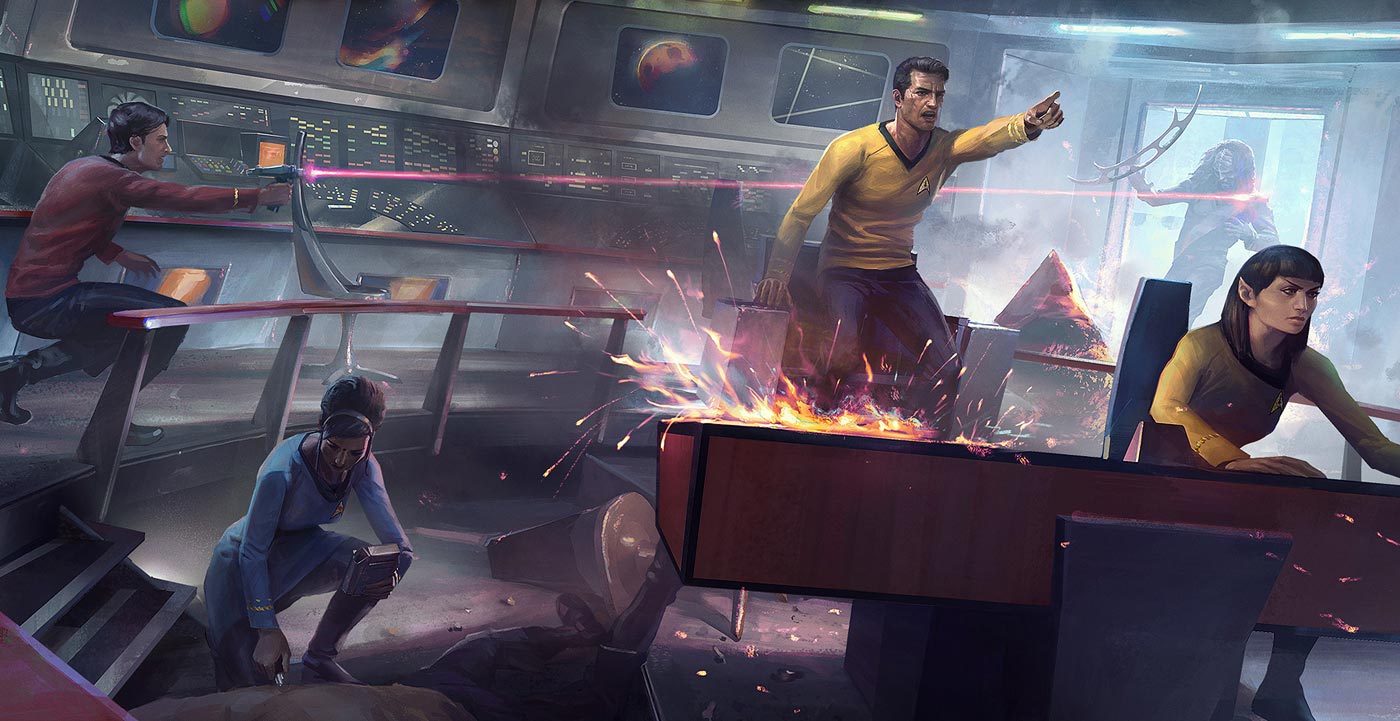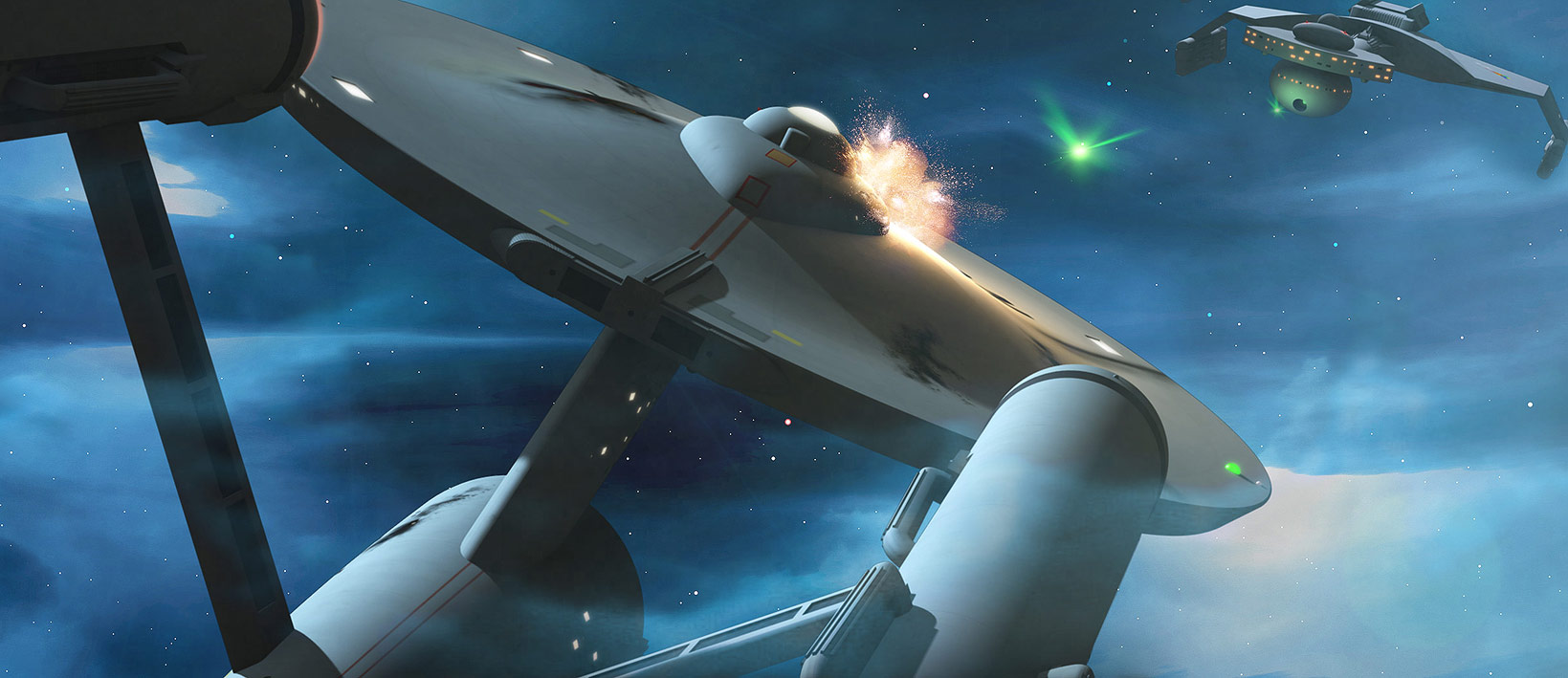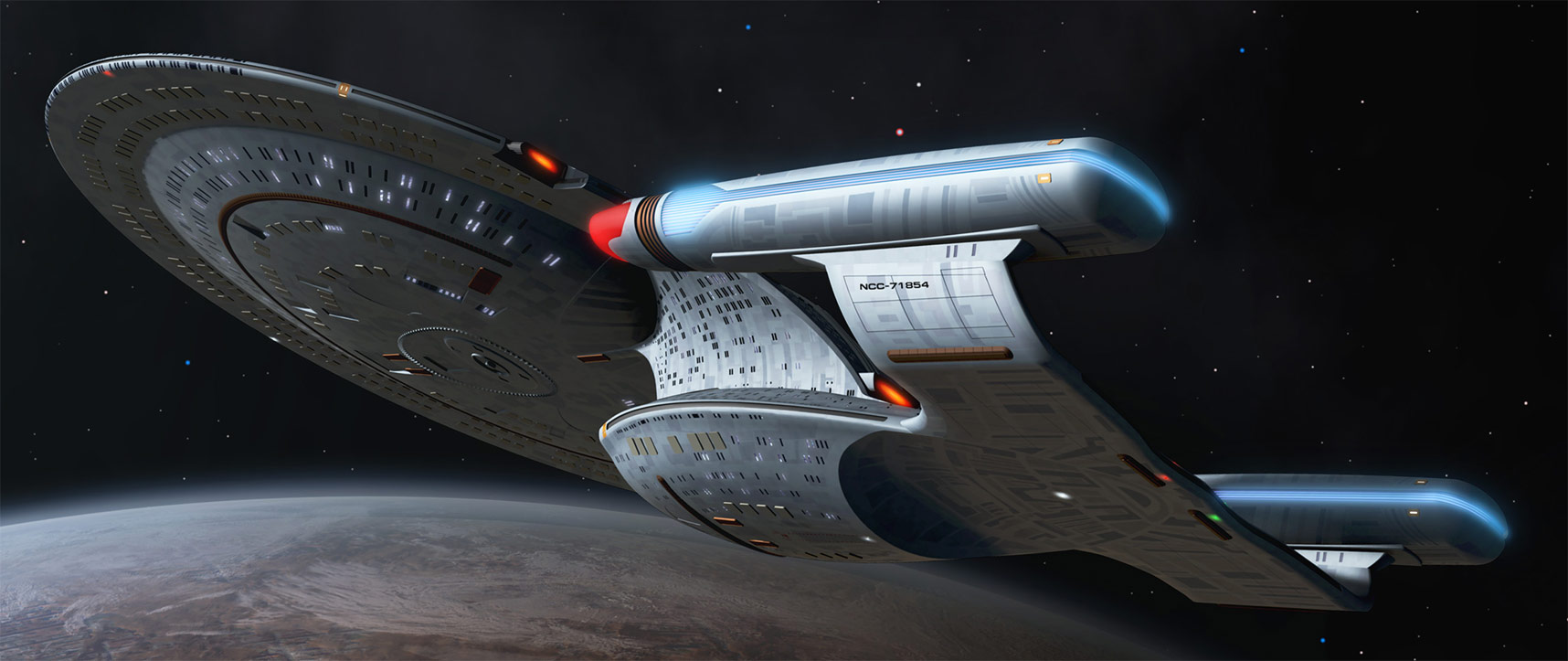Tabletop game designer Modiphius Entertainment revealed plans earlier this year to launch Star Trek Adventures, a new pen-and-paper Star Trek role-playing game, in 2017. Trek fans across the internet greeted the announcement of the first new officially licensed Trek RPG in over a decade with enthusiasm, and those of us hungry for a sneak peak cheered even harder when Modiphius announced a public playtest to help them fine-tune the game.
We’re still waiting for the first batch of playtest materials – and you can still sign up for the playtest at the Modiphius website – but fans eager for clues about how the game is shaping up can find them in various online locales.
For instance, Modiphius has confirmed that Star Trek Adventures will utilize an adapted version of the company’s proprietary 2d20 game system, which Modiphius has used for several previous games such as Mutant Chronicles and Robert E. Howard’s Conan.
Modiphius describes 2d20 as a “cinematic action orientated system” that requires players to roll two 20-sided dice, attempting to roll as low as possible to score successes. Those interested in a more in-depth look at 2d20 can score a free download of the quickstart rules for Robert E. Howard’s Conan at DriveThruRPG.
While previous Modiphius outings can certainly shed some light on what to expect from Star Trek Adventures, the game almost certainly will include some unique wrinkles to suit the Star Trek universe. A deep-dive into the message boards hosted by Modiphius, where some of the game designers post regularly, turns up a few tantalizing clues.
Here are some of the juiciest quotes from game developer Nathan Dowdell on the Star Trek Adventures message board. But be warned: the game is still under development, so it’s probably unwise to draw any sweeping conclusions from these quotes. Obviously, the game can – and likely will – change throughout the playtesting process.
On skill use: Characters in the Star Trek universe possess a huge range of skills – from maintaining warp fields, to firing phaser rifles, to handling first-contact situations on strange new worlds. So it would make sense for a Star Trek RPG to incorporate some sort of skill system into character creation.
In a message board post in August, Dowdell said the design team is aiming to present players with a limited number of skills that have a broad range of uses:
As I’ve noted elsewhere, we’re going for a small number of very broad skills, so characters have a broad baseline of competence.
A limited number of broadly useful skills hopefully will provide players with the mechanics they need to create competent and believable characters without the cumbersome and intimidating skill lists of previous iterations of Star Trek RPGs.
For instance, Last Unicorn Games, a company that produced a Star Trek RPGsline in the late 1990s, designed a game featuring scores of skills and specializations that could leave a new player’s head spinning.
On starship combat: Ship-to-ship combat can pose some interesting challenges to game designers. Presenting each player, no matter what their role on the bridge, with interesting and strategic decisions throughout a starship battle isn’t easy, and previous Star Trek RPGs have had mixed results in how they tackle the challenge.
Dowdell offered some insight into the approach Star Trek Adventures will take, suggesting players may be encouraged to try strategies that avoid combat. If that holds true, it’s sounds very much in keeping with Star Trek’s core philosophy – and maximizing player agency has always been a central tenant of tabletop role-playing games.
One thing I’m trying to go for is the idea of lateral problem-solving. Blasting things with phasers may not be the only solution to a problem, and it may not even be a good one, which means that there’s plenty of opportunities for ‘non-blasty’ approaches in and out of combat.
On crew makeup: On a separate post, Dowdell seemed to suggest that the default assumption will be for player-characters to play senior staff aboard a starship. That should come as a surprise to precisely no one, since that’s the focus of virtually every episode and film in the Star Trek canon. But it’s interesting to read Dowdell’s full comment and how he contrasts Star Trek storytelling with some of the tropes associated with big-name RPGs such as Dungeons & Dragons.
But if you’re only playing as ensigns, and rarely getting to do anything interesting, then doesn’t that kind of interfere with the point of playing ‘Star Trek’? If you’re not the Bridge Crew, then you can’t really be involved in space battles.
Unless all the characters are in the same department, there aren’t many reasons for them to cross paths all that frequently during their duties – the TNG episode “Lower Decks” is a decent one-off story, but it also shows how disconnected the junior personnel are from the action. They get given orders, they carry out the orders, but they don’t really get make any decisions, and decisions are at the heart of both good games and good stories.
If the PCs are senior staff, then they get to make the big decisions, see the big picture, and be the heroes… and that’s the interesting stuff that makes for a good game, and a good story.
Zero-to-hero doesn’t work for all RPG settings, or even most of them. It’s the standard because of D&D, but there’s no reason to assume that it should always be the case.
The Modiphius website explains that Star Trek Adventures will cover the prime Star Trek timeline, with specific mentions of the Original Series, The Next Generation, Deep Space Nine, Voyager and Enterprise. The license doesn’t include the Kelvin Timeline depicted in the J.J. Abrams movies, nor does it cover the forthcoming Star Trek: Discovery series.
There’s plenty more on the Modiphius website and message boards, and the designers seem to ask the fans for their opinions on various aspects of the game on a regular basis. So if you want to influence the future of Star Trek Adventures, participate on the boards and sign up for the free public playtest.
Once again, it’s probably too early to read too much into message board chatter about a game that hasn’t even started public playtesting. But it’s great fun to speculate about these things, and it’s been far too long since Trek fans and gamers have had an officially licensed rpg to speculate about.
Keep checking TrekCore for further coverage of Star Trek Adventures, and all other Trek gaming!



